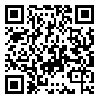BibTeX | RIS | EndNote | Medlars | ProCite | Reference Manager | RefWorks
Send citation to:
URL: http://hii.khu.ac.ir/article-1-2530-en.html
Background and Aim: The current study aimed to investigate "ambiguous aversion behavior" based on Quran explains. The lack of "Descriptive Models of Human Behaviour" (DMHB) is one of the oldest anomalies in behavioral sciences. It's because different scientific demands to understand, predict and control human behavior. Specially, ambiguous aversion that is a common behavior and extremely influences different scientific issues.
Methods: The methodology and all the steps of this research in preparing, organizing text, studying, and documentation, coding, abstraction and final conclusions are based on qualitative content analysis. The model is identified and explained thorough the deep studies in scientific literature of DMHB and Quran text. Quran in this research is the source of idea to find DMHB; also the guide of explaining DMHB.
Results: The results showed that 814 phrase of Quran (Ayah) are related to DMHB and ambiguous aversion behavior. The final model could be explained in the scientific standard structure -as "Ideal Type of DMHB"- so its Comprehensiveness to explain a behavioral model is approved. Also, its relations to other renowned theories is discussed.
Conclusion: According to the results, in this paper we developed new model of "Ambiguous Aversion" that describes why people tend to resist against changes and ambiguous situations; and what their behavioral strategies are. The basic reason of ambiguous aversion is avoiding uncertainty to owning utilities. And human feels uncertainty when he feels situational changes. His behavioral strategies against change are: change denial, interpreting not important change, change resistance. Also his direct behavioral strategies against ambiguous are: clarification, Risk coverage and resource possessing.
| Rights and permissions | |
 | This work is licensed under a Creative Commons Attribution-NonCommercial 4.0 International License. |






